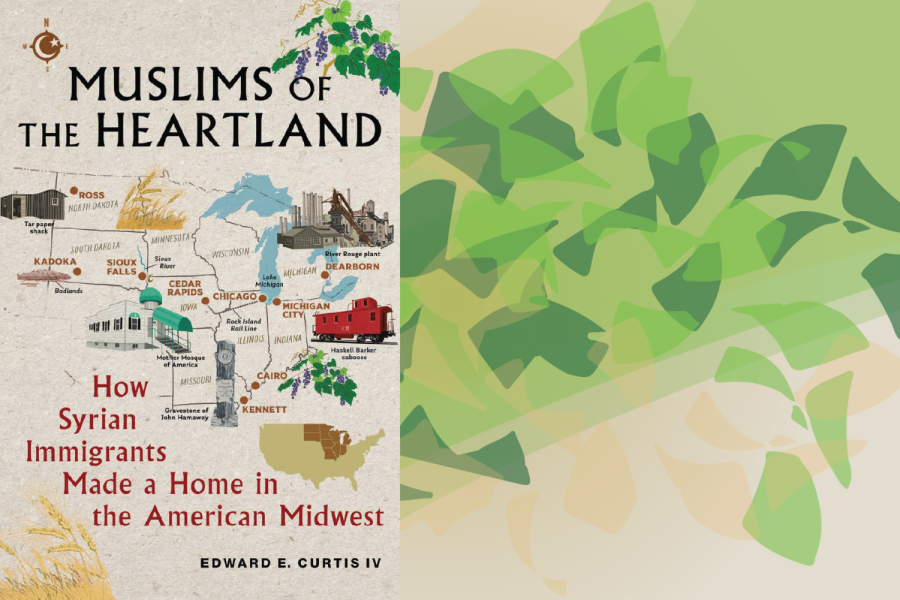Edward Curtis presents book ‘Muslims of the Heartland’
The cover Edward E. Curtis’ “Muslims of the Heartland: How Syrian Immigrants Made a Home in the American Midwest.” Curtis spoke to an audience of Northwestern students about his book at a Wednesday event.
October 27, 2021
Edward Curtis, a Syrian-Lebanese professor of religious studies at Indiana University – Purdue University Indianapolis, introduced his book in a Wednesday event hosted by Shepard Residential College.
Curtis’ book, “Muslims of the Heartland: How Syrian Immigrants Made a Home in the American Midwest,” highlights the narratives of Syrian immigrants in the American midwest. At the event, he spoke to an audience of Northwestern students, including a class of Arabic studies and culture taught by Prof. Fatima Khan.
His book focuses on narratives from several Muslim emigrants from the Greater Syrian diaspora of the early 20th Century.
“Over half a million people left Greater Syria after the fall of the Ottoman Empire and emigrated to places all over the Americas,” Curtis said. “The American Midwest was a human geography, not a natural geography. It was connected by river, then rail and then road.”
Referencing Khan’s class, Curtis said it’s essential to know some Arabic when studying the Greater Syrian diaspora, because language skills help for identifying names and information. During his lecture, Curtis examined data from the census, homestead grants and land patents to recreate the lives he narrates in his book.
Curtis described how Arab-speaking immigrants built thriving Muslim communities within the American Midwest during the early 20th Century. With land grants and homesteads, immigrants could get land and start lives around new cities, Curtis said.
“It’s partly just chance, and the story of chain migration everywhere. Somebody comes, they have some success and then write home to friends and family offering to help them,” he said. “Some places stick and some places don’t. Some people went there because of advertisements. For others, it was simply where you got off the train.”
He told the stories of immigrants in South Dakota who set down roots through building local mosques and creating Arabic newspapers.
Curtis said he focused on including people who have multiple intersecting identities.
“You can be Muslim and Arab and American,” Curtis said. “You can be all three at the same time.”
Khan, who organized the event, said Muslim and Middle Eastern narratives are often overlooked. Today, the United States census does not acknowledge Middle Easterners as non-White people, which Khan said makes it difficult to garner awareness of Middle Eastern Americans and Muslim Americans.
Khan teaches an Arabic language course, “I am American,” which is new this year. She said the course focuses on more than just language — it explores what it means to be American and to have coexisting identities.
“I wanted the general public to have a way to learn about this,” Khan said. “That way it’s not only supplemental to my course but something that the entire University community can benefit from. We see with Curtis’ book that America has never been a monolith. Arabs and Muslims have a very deep history in this country that goes back centuries.”
Weinberg sophomore Jane Mavis, who attended the event, said Curtis’ book provided a new perspective.
“It was unexpected and interesting to hear about how being Muslim helped people assimilate but maintain their culture at the same time,” Mavis said.
For people with an interest in historical fiction, Curtis’ book is educational and accessible, Mavis said.
Despite the historical setting of his book, Curtis said its narrative style provides an opportunity for everyone to learn about the history of Middle Eastern immigrants throughout the United States.
“This book is a popular history, not an academic history. It’s for a broad audience,” Curtis said. “It’s a story about these Muslim, Arab, American lives.”
Email: KatherineMcDonnell2025@u.northwestern.edu
Twitter: @KatherineMcD33
Related Stories:
— NU Prof Khan creates online Arab dictionary
— Students form Muslim Mental Health Initiative, advocate for inclusive mental health services
— Ibrahim: Northwestern renders Middle Eastern and North African students invisible



